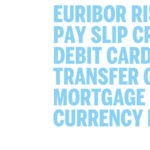10 terms you should know to manage your finances
Understanding personal finance is essential to handle everyday life in a household. This means making informed financial decisions to manage the income and expenses of any family properly. Today is Financial Education Day, a fundamental issue to manage a household economy.

Keeping track of accounts, managing credit to avoid taking on debt unnecessarily and planning for retirement. These basic personal finance issues are unfinished business in Spain and many other countries for children, young people and adults.
What is the Euribor and how does it affect a mortgage, how does a credit card work, and what does information in a pay slip mean are more complex concepts that are not easy for everyone to understand. This lack of knowledge creates high risk for their well-being. We need to be capable of correctly interpreting these issues in order to deal with them in our everyday lives.
Some banks like BBVA are taking the initiative to promote financial education. The goal is to help develop financial knowledge and skills which allow society to make informed decisions to improve their financial well-being and be more aware of the risks and opportunities that exist. Financial education is one of the strategic priorities in the BBVA Group’s Responsible Banking Plan.
In commemoration of Financial Education Day, we are going to explain the 10 terms you should be familiar with to manage your personal finances and understand some basic financial concepts.
- Euribor: is the average interest rates at which banks offer to lend money in the euro interbank market. Banks uses different interest rates depending on the length of the loan. This means there is a Euribor for a week, a month or a year. Variable rate mortgages also use the Euribor as a benchmark to calculate the interest rate.
- Risk premium: is used to determine the interest a government must pay investors who have purchased its debt. The greater the risk investors assume (in other words, the probability that the government will not repay the amount borrowed), the higher the risk premium.
- Pay slip: is an essential document given to employees, which shows the details of their salary, including the amount deducted - either for taxes required by current legislation, or other factors like advances or healthcare.
- Credit card: is a payment method that allows customers to obtain money that is not yet in their bank account, but which they will supposedly have at the time they need to return the money. Credit cards can be used to make payments or obtain money up to the credit limit, without having to have the money in a bank account at the time. Card holders can choose whether to pay the entire amount at the end of the month with no interest, or return the money in installments with an interest rate on the outstanding amount.
- Debit card: is a card that directly and instantly charges the amount to the card holder’s account, whether it is a savings book, checking account or even a credit line. This means that sufficient money (or credit line) must be available to make the payment with this card.
- Wire transfer: is an operation which involves a person (the payer) giving instructions to their bank to take a certain amount of money from their account to send to another person’s (the recipient) account in the same bank or in another bank.
- Guarantee: means that a person, the guarantor, backs the obligations of someone else (the debtor) to a third party (the recipient) with their estate. Bank guarantees mean that the bank is backing a customer, and the recipient is the party interested to guaranteeing the obligation.
- Mortgage: is commonly used to refer to a home loan, in other words a loan to help purchase a home. The mortgage is the property right or home loan guarantee established to guarantee the payment of the loan. The collateral for the loan is generally the home being purchased.
- Credit: involves a financial institution providing a customer an amount of capital that varies depending on their financial needs. The customer only pays interest on the amount borrowed and a small commission for the available amount that has not been withdrawn.
- Currency exchange: refers to all operations in which a certain asset, financial instrument or payment method (i.e. cash, checks, deposits, loans, etc.) go from being expressed in a certain currency (a country or economic zone’s currency) to a different currency.